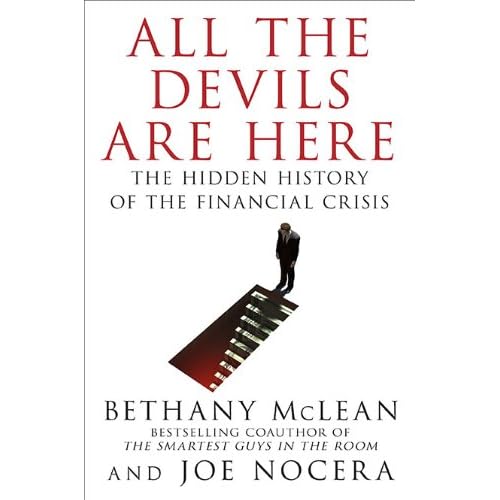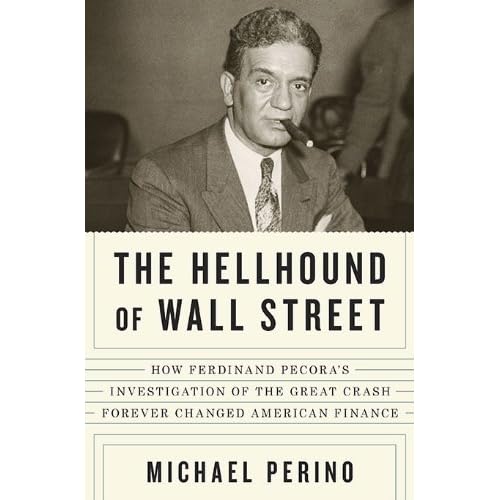
It is very much worth the effort to read both works--probably start with the Depression era hearings – it’s a real cliff-hanger as to whether there were actually going to be any real, substantive hearings, as it was the final weeks of the lame-duck session of Congress between the election in 1932 and the changing of the guard, Hoobert Hever to FDR, in March, 1933. Pecora was brought pretty much by chance, in the very last days of the session.
He subpoenaed Charlie “Sunshine” Mitchell, the president of City Bank, which I think actually was the predecessor to the spelling-challenged Citi Bank that, along with Bear Stearns, Lehman Brothers, AIG, Merrill-Lynch, Golden Sax, ... who am I missing? helped us all out of the money we used to have in paychecks, mortgages, pension and health insurance plans. And ol’ Charlie, it turns out, was taking $1mm in a pay package, as well. Charlie had set up a stock-manufacturing arm in parallel with the banking arm--so, a brokerage and a bank-for-broke. Had branch banks and branch brokerages all over the US (kind of the Merrill-Lynch paradigm). And pretty much just like the 1980s, 90s and Naughts, when the big “investment” (meaning “gambling casino”) banks started to act like they had deposits and brokerages at the same time.
In both the 1920s and 1930s, the banksters (and the word was popular back then, too, it appears), advertised to beat the band that they were the experts, people could rely on them, trustworthy, knowledgeable, offered only the best, soundest investments, etc. Back then, without an SEC and Glass -Steagall (Glass was one of the senators on the Banking Committee then) and with a population not in the least educated about the ways of the Wall Street Casino, it was pretty easy to fool almost all of the people all the time.
The basic problem was that the bank execs put themselves first, were using people's deposits, and people's stock and bond purchase proceeds to make themselves richer.
Which is basically what happened all over again in Great Depression II. And of course, in the 1930s, the banks howled like crazy that they didn't need any stinkin’ regulations--just as they had been for, what, since the Reagan Administration. The market will regulate itself, Alan Greenspan and the other folks from Golden Sax, etc., kept insisting. And when Congress and the White House (legislative & executive branches) let these Wall Streeters slip their leashes, what happened? Same, same as in the Roaring 20s. Self-dealing, bubble pumping, etc.
Having two of these massive depressions in a row – despite the 80 year gap of sort-of stability –should probably teach us that:
- Banksters in particular have a propensity -- and intensity -- for pelf. Not that they're completely off the charts with the rest of humanity, but they like to play with money, especially OPM (other people's money), and be at the spot where money changes hands, so they can take a chunk of every transaction. They’re gamblers.
- Banksters’ promises of self-regulation, fiduciary duty, morality, good character ... are just so much hot air, unless there's a cop on the beat.
- Like other human beings, banksters will lie when it suits them, shade the truth when it suits them. If they can get away with it. And, as gamblers, they’ll probably thrive on the frisson of perhaps getting caught.
- Letting people who have a particular passion for money and gambling with it run the economy without complete transparency, complete disclosure, regulations and regulators, etc., is stupid. Burn us once, shame on you; burn us twice, shame on us. So, while I was not alive during the Great Depression I, Hellhound brings one up to speed in telling the tale of Ferdinand Pecora. And All the Devils nicely gathers together all of the pieces of Great Depression II.
Perhaps the most important lesson I draw from these two Depression books (I think we're in another Depression, as unemployment (or "labor underutilization," as the Bureau of Labor Statistics has now euphemised it),) is that unless we choose a different method of allocating our tax money, it is irresponsible for us to leave it in Washington's hands. Our new goal should be to keep our money under local control. Either in our own wallets, or within the state coffers, remembering that it is far simpler to get to the state capitols of the 50 states than it is for most of us to get to Washington, DC.
And how we go about managing to keep our money local is the subject of my Work-In-Progress, HEY? or Had Enough Yet? at the web log titled Don't Marry: Incorporate!
The idea is simple enough: Every person (and every couple, every family) is, at the core, a business. All of us are, at the broadest reach, in business to take care of ourselves, to exchange our capabilities, in the form of goods and services, for some medium of exchange – money comes to mind – and as we go about conducting our business, we seek to make a profit, come out ahead of the game. It is a profit-making enterprise. And we should recognize that, and all conduct our lives as business corporations.
If that seems too strange a concept, I remind you that our very own Supreme Court has now held that corporations are people too, despite all the limitations and challenges faced in being a person and doing what a person does by the simple 25# sheet of paper that is the corporation-- the corporate charter. The corporate charter has only four corners, four edges, and two sides. It has no muscles, no opposable thumb and fingers with which to sign documents. It can't go swimming, or even take a shower, without disintegrating, and so on. But, despite all of those challenges, in the US at least, a corporate charter is to be treated as a "person".
So the obvious corollary to this is, People are Corporations, Too. And as you start to think about it with me, it's not such a strange or outlandish concept.
Particularly as families, we have educational programs, we perform work of all kinds, we use transportation, we have our own cafeteria, our own corporate headquarters. We provide uniforms for our corporate officials, sickness care, sometimes health insurance. We sub-contract the training of our youngest officials, for which we are assessed property taxes, etc. And, as corporations, vis-a-vis the states and the federal government, we can, on our 1160 federal tax forms, take deductions, and/or give capital treatment (amortization; depreciation) for our expenses, our equipment, and so on--all the reasonable and necessary expenses faced by a going corporation.


